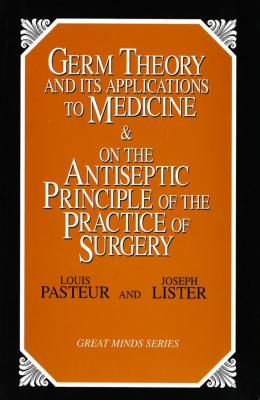Before the introduction of antisepsis and inoculation, people commonly died due to unsanitary conditions in the home, or following surgery or childbirth. Between them, the great scientists Louis Pasteur (1822-1893) and Joseph Lister (1827-1912) extended widely the practice of inoculation and revolutionized medical practice. Pasteur's discovery that living organisms are the cause of fermentation formed the basis of the modern germ theory. Following Pasteur's researches, Lister proceeded to develop his antiseptic surgical methods. These breakthroughs in medicine are to be reckoned among the greatest discoveries of the nineteenth century.
| FindBook |
有 1 項符合
Germ Theory and Its Applications to Medicine and on the Antiseptic Principle of the Practice of Surgery的圖書 |
 |
Germ Theory and Its Applications to Medicine and on the Antiseptic Principle of the Practice of Surgery 作者:Pasteur 出版社:Prometheus Books 出版日期:1996-05-01 語言:英文 規格:平裝 / 144頁 / 21.6 x 14.2 x 1 cm / 普通級/ 初版 |
| 圖書館借閱 |
| 國家圖書館 | 全國圖書書目資訊網 | 國立公共資訊圖書館 | 電子書服務平台 | MetaCat 跨館整合查詢 |
| 臺北市立圖書館 | 新北市立圖書館 | 基隆市公共圖書館 | 桃園市立圖書館 | 新竹縣公共圖書館 |
| 苗栗縣立圖書館 | 臺中市立圖書館 | 彰化縣公共圖書館 | 南投縣文化局 | 雲林縣公共圖書館 |
| 嘉義縣圖書館 | 臺南市立圖書館 | 高雄市立圖書館 | 屏東縣公共圖書館 | 宜蘭縣公共圖書館 |
| 花蓮縣文化局 | 臺東縣文化處 |
|
|
圖書介紹 - 資料來源:博客來 評分:
圖書名稱:Germ Theory and Its Applications to Medicine and on the Antiseptic Principle of the Practice of Surgery
內容簡介
作者簡介
Louis Pasteur (1822-1893) held many academic posts and received numerous awards both in France and abroad. His investigations into fermentation, food preservation, diseases affecting silkworms, anthrax and fowl cholera had tremendous commercial applications and led to conclusions that revolutionized physiology, pathology, and therapeutics. His discovery that most familiar diseases are caused by germs is one of the most important in the history of medicine and brought vast changes in hospital practice. By his studies in the culture of weakened strains of bacteria, Pasteur greatly extended the practice of inoculation with a milder form of various diseases, in order to produce immunity.
Joseph Lister (1827-1912) was surgeon to the Royal Infirmary in Glasgow, Scotland, where for eight years he developed his system of antiseptic surgery. He investigated a number of problems relating to postoperative inflammation and pus formation and the coagulation of blood in wound healing. Aware of Pasteur’s work on the relation between microorganisms and putrefaction, Lister came to realize that postoperative infections were due to bacteria. His antiseptic methods of surgery gradually won wide acceptance, thus greatly reducing levels of infection and death following surgery. Later in his career, Lister became surgeon to Queen Victoria.
|











